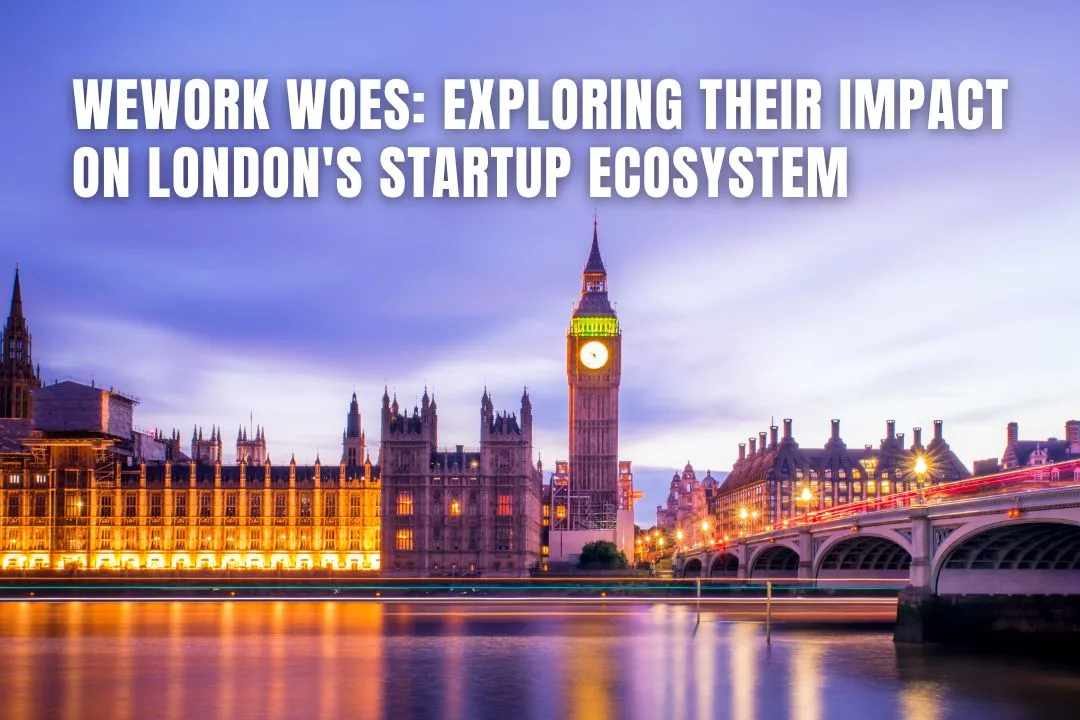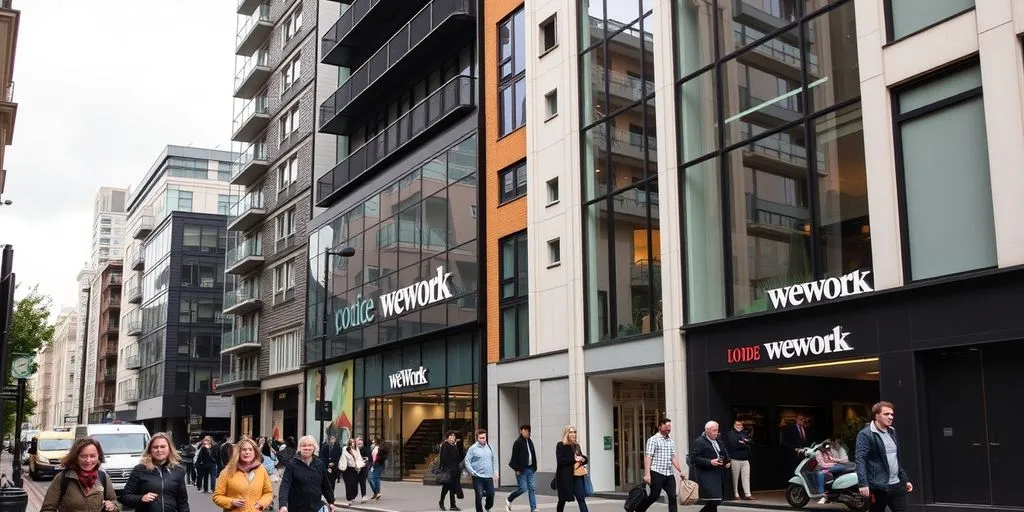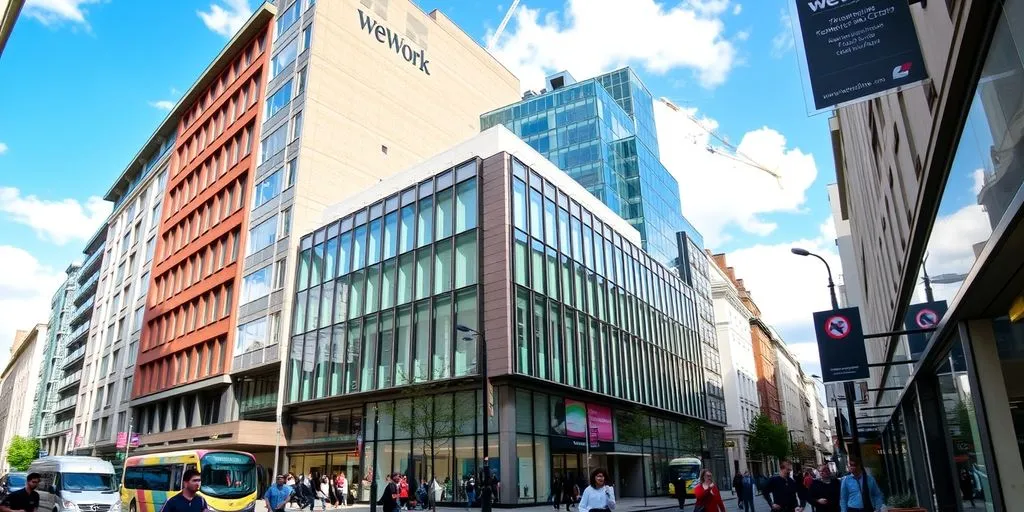September 17, 2024

WeWork's journey in London has been a rollercoaster, marked by rapid growth and a dramatic downfall. Once a beacon of innovation in the co-working space, WeWork's influence on London's startup scene has been significant. This article delves into the rise and fall of WeWork in London, its effects on startups, and the future of co-working spaces in the city.
WeWork's journey in London began with rapid expansion and early success. The company quickly became a popular choice for startups and freelancers, offering flexible office spaces and a vibrant community. WeWork's model of leasing large office spaces and then renting them out as smaller units was a hit. The company promised more than just a desk; it offered a lifestyle with perks like free coffee, social events, and networking opportunities.
However, the road wasn't always smooth. WeWork faced several challenges and controversies. The company's valuation, which once soared to $47 billion, came under scrutiny. Investors began to question the sustainability of its business model. The leadership style of co-founder Adam Neumann also raised eyebrows. Reports of extravagant spending and a chaotic work environment started to surface. These issues led to a significant drop in investor confidence.
The COVID-19 pandemic dealt a severe blow to WeWork. With more people working from home, the demand for office space plummeted. This shift had a profound impact on WeWork's operations in London. The company struggled to maintain its occupancy rates and faced mounting financial pressures. The pandemic highlighted the vulnerabilities in WeWork's business model, leading to further declines in its valuation and market position.
The rise and fall of WeWork in London is a tale of rapid growth, significant challenges, and the unforeseen impact of a global pandemic. It serves as a reminder of the importance of sustainable business practises and the unpredictable nature of the market.
The rise and fall of WeWork has significantly altered the demand for office spaces in London. Startups, which once flocked to WeWork's trendy and flexible spaces, are now exploring other options. The pandemic further accelerated this shift, as remote work became the norm. Consequently, many startups are now opting for smaller, more cost-effective spaces or even fully remote setups.
WeWork was more than just an office space provider; it was a community hub for startups. The company's decline has left a void in the startup culture in London. Many entrepreneurs miss the networking opportunities and the sense of community that WeWork fostered. This has led to a rise in alternative co-working spaces and community-driven workspaces that aim to fill this gap.
The financial instability of WeWork has had ripple effects on startups that relied on their services. Some startups faced sudden relocations, while others had to deal with the financial strain of lost deposits and increased costs. This has made startups more cautious about their office space commitments, leading to a preference for more stable and transparent providers.
The impact of WeWork's troubles on London's startup ecosystem is a reminder of the importance of sustainable business practises. Startups are now more vigilant about the financial health of their service providers, ensuring they don't face similar disruptions in the future.

WeWork's downfall can be traced to two major crises. First, the end of its venture capital-fueled heyday left it without the financial cushion it once enjoyed. Second, the pandemic drastically changed the office space market. Remote work became the norm, reducing the need for office spaces, which was WeWork's main product. The company also struggled with a massive debt load and long-term leases in expensive real estate markets.
After filing for Chapter 11 bankruptcy, WeWork aimed to address its debt and real-estate portfolio. This move allowed the company to reject financially burdensome leases and negotiate better terms. However, the bankruptcy filing caused concerns over the future of the co-working office space market. WeWork, once London's biggest tenant, now faced an uncertain future.
The long-term effects of WeWork's bankruptcy on the market are still unfolding. The company's collapse has shifted its name towards those of other failed unicorns like Theranos and FTX. The bankruptcy has also highlighted the risks of overvaluation and the importance of sustainable growth. As the market adjusts, other co-working spaces and office solutions may rise to fill the gap left by WeWork.
London offers a variety of co-working spaces that cater to different needs and preferences. Here's a quick list of London's biggest flexible workspace providers:
These spaces provide a range of amenities and environments, from luxurious and affordable options to creative and innovative hubs.
For startups looking for more than just office space, London is home to numerous incubators and accelerators. These programmes offer mentorship, funding, and networking opportunities. Some notable ones include:
Engaging in these programmes can be a valuable investment for entrepreneurs seeking to enhance their skills and grow their startups.
Community-driven workspaces are another great alternative to WeWork. These spaces focus on building a strong sense of community and collaboration among their members. Some popular options are:
These workspaces not only provide a place to work but also foster a supportive environment where startups can thrive.
Whether you're looking for a flexible workspace, an accelerator programme, or a community-driven environment, London has plenty of alternatives to WeWork that can meet your needs.

WeWork's rapid rise and even faster fall highlight the importance of sustainable growth. The company expanded aggressively, acquiring long-term leases in expensive real estate markets. However, this strategy backfired when demand for office space plummeted. Sustainable growth requires careful planning and a balance between expansion and stability.
WeWork's peak valuation of $47 billion in 2019 was not reflective of its actual business model. Investors initially saw it as a tech company, but it was essentially an office rental business. This overvaluation led to unrealistic expectations and ultimately, disappointment. Companies must ensure their valuations are grounded in reality to avoid similar pitfalls.
The pandemic drastically changed the demand for office spaces, forcing many companies to adopt remote work. This shift has led to a reevaluation of the co-working space model. While the demand for flexible office solutions remains, the future of co-working spaces will likely involve more hybrid models and innovative approaches to meet changing needs.
WeWork's journey serves as a cautionary tale for startups and investors alike, emphasising the need for strategic planning and realistic valuations.
The pandemic has reshaped how we work, and hybrid working is now a major trend. Many businesses are adopting flexible schedules, allowing employees to work both from home and the office. This shift has led to a change in office space demand, with companies seeking smaller, more adaptable spaces.
Technology is playing a crucial role in the evolution of co-working spaces. From high-speed internet to advanced security systems, tech innovations are making these spaces more efficient and attractive. Virtual reality (VR) and augmented reality (AR) are also being explored to create immersive work environments.
In the next ten years, we can expect co-working spaces to become even more integrated into the business ecosystem. They will likely offer more specialised services, catering to specific industries like fintech or creative arts. The focus will be on creating community-driven workspaces that foster collaboration and innovation.
The future of co-working in London looks promising, with a blend of flexibility, technology, and community at its core.
The story of WeWork serves as a cautionary tale for London's startup ecosystem. While the company promised a revolution in office culture, its rapid rise and even faster fall highlight the risks of overvaluation and the impact of unforeseen events like the pandemic. For many startups, WeWork provided a convenient solution to office space needs, but its struggles have forced them to rethink their strategies. As London continues to be a hub for innovation, the lessons learned from WeWork's journey will be crucial. Startups must balance ambition with sustainability, ensuring they are prepared for both the highs and the lows of the business world. The future of London's startup scene remains bright, but it will be shaped by the experiences and challenges faced by companies like WeWork.
WeWork's troubles began with its rapid expansion and high costs. The pandemic made things worse by reducing the demand for office spaces.
The pandemic caused many businesses to shift to remote work, reducing the need for office space. This hit WeWork hard as it struggled to fill its locations.
Startups using WeWork faced higher costs and uncertainty due to the company's financial instability and eventual bankruptcy.
Yes, there are many alternatives including co-working spaces like The Trampery, incubators like Barclays Accelerator, and community-driven workspaces.
WeWork's story highlights the importance of sustainable growth, the risks of overvaluation, and the need for a solid business model.
The future of co-working spaces in London will likely include more flexible terms, technological innovations, and adaptations to post-pandemic work trends.